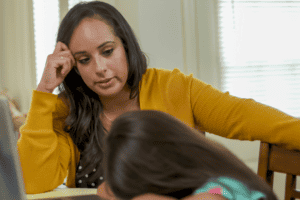Wait, what’s wrong with the title? Yes, it is the opposite of what we are told by professionals. Yet I want to harken back to the days of “do as I say, not as I do” parenting. The cause of my abrupt change of attitude? When asked (in my peppy, this will be fun voice) if she wanted to help fold towels, the kid replied with a resounding NO! That “no” came at the end of a week filled with lots of stress and aggravation.
I followed-up with a reminder (delivered in a pleasant, but not as peppy voice) that this was her chore, which provoked an even more impolite “no”. You parents know where this is headed. Instructions became barking orders from me, followed by copious tears and screaming from her.
There are great resources that teach positive parenting techniques, which I try to follow. These are fantastic ideas, which have worked, at times, with my strong-willed, oppositionally-defiant daughter.
Problem is, these actions are hard.
It’s hard to re-wire the way you were raised with how you want to parent. Hard to remember when you’re standing over a screaming child in the grocery store aisle. Hard to stick-to-it when they aren’t always effective. Hard to use when you get caught up in the same emotions that your dear child is suffering from.
So yes, the yelling happens. The phrase “because I told you so” flies out my mouth more times than I thought possible. The empty threats of throwing out every toy gets bandied about.
So, what is the answer?
There isn’t one answer, there are many.
First is honesty. Be honest with yourself and your reality. Stop trying to be a great parent, all on your own, but rather reach out for help and be happy with being “just” a good parent. Find resources that will help you cope and allow your child to thrive. Be honest with your kids. Admit you lost your temper. Explain to them you were (still are) stressed. Apologize for those mean words or tone. Show them bad times can be turned around, for you and for them.
Second is kindness. Kindness to yourself. Embrace those mistakes, and then learn from them. Then show those little ones some kindness by asking for a hug. Explaining to them your behavior and how to make up for it. Allow them to give you kindness even though you weren’t perfect. Let them see everyone needs kindness.
Third is knowledge. Learn about yourself and your limitations. It is important to know your own triggers as well as your child’s. Keep learning, and practicing, positive parent techniques. Nothing will sting more than your teenager (or precocious 6 yr. old) using your words against you! And when it does happen, be GLAD you imparted your knowledge onto them.
But this is not where the list ends. Find your own terms. Figure out how you come back from failures. Then talk about it. Share your stories with others. You never know who you may help with your words. The more imperfect tales of parenting we continue to share will help create a more perfect, but not unrealistic, place for children.



